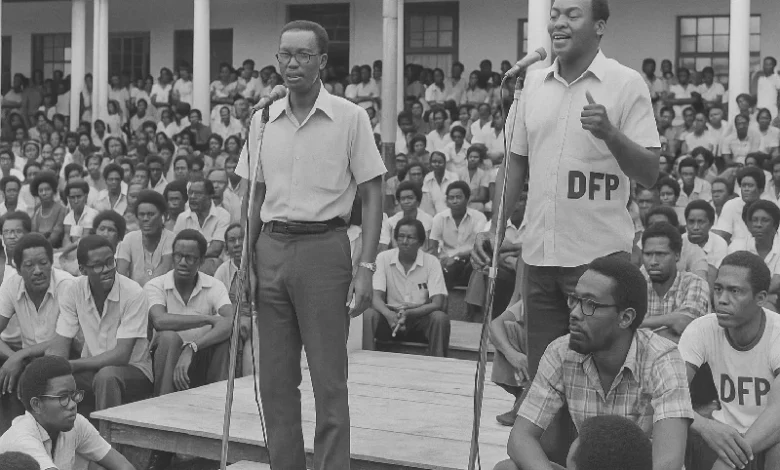1980 General Elections in Dominica

The 1980 general elections in Dominica, held on July 21, represented a key turning point in the island’s political direction. These elections marked the first since Dominica gained independence from the United Kingdom in 1978, transitioning from colonial rule to self-governance. The electoral process reflected the nation’s dedication to democratic values and initiated significant political change.
Political Context of the 1980 General Elections in Dominica
Leading up to the elections, Dominica experienced political turbulence. The Dominica Labour Party (DLP), which had governed since 1961 under Premier Edward Oliver LeBlanc, faced internal divisions and public dissatisfaction. In 1979, Prime Minister Patrick Roland John was forced to resign amid civil unrest and allegations of authoritarianism. An interim government led by Oliver James Seraphin was established to stabilise the nation and prepare for democratic elections.
Participating Political Parties and Leaders
Several political parties contested the 1980 elections:
- Dominica Freedom Party (DFP): Led by Mary Eugenia Charles, the DFP advocated for democratic reforms and transparency.
- Dominica Labour Party (DLP): The incumbent party, previously led by Patrick John, sought to retain power despite internal challenges.
- Dominica Democratic Labour Party (DDLP): A splinter group from the DLP, led by Oliver Seraphin, representing a moderate alternative.
- Dominica Liberation Movement Alliance (DLMA): A leftist party promoting socialist policies.
- Independent Candidates: Various individuals contested seats without party affiliation.
Election Results Overview
The election results were a landslide victory for the DFP:
| Party | Votes | % | Seats | Seat Change |
|---|---|---|---|---|
| Dominica Freedom Party (DFP) | 15,706 | 51.34% | 17 | +14 |
| Dominica Democratic Labour Party (DDLP) | 6,034 | 19.72% | 2 | New |
| Dominica Labour Party (DLP) | 5,126 | 16.75% | 0 | -16 |
| Dominica Liberation Movement Alliance (DLMA) | 2,575 | 8.42% | 0 | New |
| Independents | 1,154 | 3.77% | 2 | 0 |
| Total Valid Votes | 30,595 | 100% | 21 |
Voter turnout was notably high at 80.2%, indicating strong public engagement in the democratic process.
Constituency-Level Results
While detailed constituency-level data is extensive, here is a snapshot of selected constituencies:
| Constituency | Electorate | Votes | Elected Rep. | Party |
|---|---|---|---|---|
| Castle Bruce Constituency | 1,629 | 1,351 | Oliver Sanderson | DFP |
| Colihaut Constituency | 975 | 765 | Alvin Armantrading | DFP |
| Cottage Constituency | 1,101 | 905 | Alleyne Carbon | DFP |
| Grand Bay Constituency | 2,309 | 1,718 | Judiana Henderson | DFP |
| La Plaine Constituency | 1,532 | 1,258 | Heskeith Alexander | DFP |
| Mahaut Constituency | 2,334 | 1,937 | Brian Alleyne | DFP |
| Marigot Constituency | 1,787 | 1,411 | Pattison Stevens | DFP |
| Morne Jaune/Riviere Cyrique Constituency | 815 | 703 | Conrad Cyrus | INDE |
| Paix Bouche Constituency | 1,116 | 924 | Jenner Armour | INDE |
| Petite Savanne Constituency | 1,587 | 1,267 | Ralph Fadelle | DFP |
| Portsmouth Constituency | 1,649 | 1,332 | Micheal Douglas | DDLP |
| Roseau Central Constituency | 2,949 | 2,265 | Mary Eugenia Charles | DFP |
| Roseau North Constituency | 4,770 | 3,687 | Henry Dyer | DFP |
| Roseau South Constituency | 2,464 | 1,997 | Ronan David | DFP |
| Roseau Valley Constituency | 972 | 835 | Henry George | DFP |
| Salisbury Constituency | 1,508 | 1,283 | Dennison John | DFP |
| Salybia Constituency | 1,138 | 935 | Matthew Joseph | DDLP |
| Soufriere Constituency | 1,892 | 1,497 | Anthony Moise | DFP |
| St. Joseph Constituency | 2,166 | 1,658 | Kelleb Laurent | DFP |
| Vieille Case Constituency | 1,414 | 1,196 | Alexis Williams | DFP |
| Wesley Constituency | 2,295 | 1,918 | Kenneth Williams | DFP |
These results reflect the widespread support for the DFP across various regions.
Notable Outcomes and Analysis
- Historic Leadership: Mary Eugenia Charles became the first female Prime Minister of Dominica and the first woman elected as head of government, symbolizing a significant step forward for gender equality in politics.
- DLP’s Decline: The DLP’s complete loss of parliamentary representation marked a dramatic shift in the political landscape, attributed to public disillusionment with its previous governance.
- Emergence of New Parties: The DDLP’s acquisition of two seats demonstrated the electorate’s openness to alternative political voices, while the DLMA’s failure to secure seats highlighted the challenges faced by new parties in gaining traction.
Electoral Integrity and Observations
The elections were conducted under the supervision of the Electoral Office, ensuring adherence to democratic standards. While there were minor reports of campaigning within restricted zones, no significant irregularities were documented. The peaceful transition of power underscored Dominica’s commitment to democratic principles.
Conclusion
The 1980 general elections were a defining moment in Dominica’s post-independence era. The electorate’s decisive support for the DFP signalled a desire for change and reform. The elections’ peaceful and democratic nature set a precedent for future political processes in the nation.




